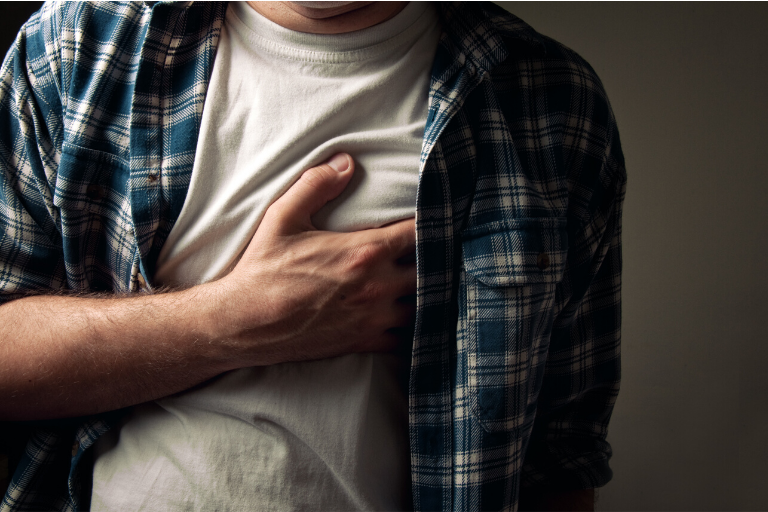Chest Pain From Anxiety - Why it Occurs and How to Overcome It
Chest pain from anxiety is a sensation that can start suddenly, causing extreme discomfort. Understand and deal with this common anxiety symptom…

When chest pain occurs because of anxiety, it can throw you completely off balance. Understanding the connection between chest pain and anxiety can help you find relief from chest tightness and any other discomfort you may experience.
What Does Chest Pain From Anxiety Feel Like?
Picture this: although you have been suffering from anxiety for a while, you’ve recently experienced something scary that you’ve never felt before.
It’s not unusual for you to have symptoms like stomach upset when you feel anxious or stressed, but this feeling is different.
It’s night time, and as you lie on your bed, you reflect on some of the problems you are currently facing.
All of a sudden, you start feeling overwhelmed. The anxiety is building and you don’t know what to do.
Within moments you start feeling a strange sensation, you start experiencing a sharp stabbing and tearing pain in your chest whenever you inhale.
You’ve never experienced this before so you immediately get worried that you’re experiencing a heart attack or something like that.
To add to your anxiety, you start thinking about the fact that you live alone and don’t know how you are going to get out of this situation if it gets worse.
The more you get anxious, the worse the pain gets, becoming uncontrollable and causing you to press your chest around where it hurts.
That’s what it feels like to have chest pain from anxiety. Someone who frequently suffered with chest pain and anxiety once described it as an “unwavering psychosomatic pain” that prevents you from functioning normally.
What is Anxiety Chest Pain?
Chest pain is a common symptom of anxiety and panic attacks. Research shows that 12-16% of people experience this symptom and that most people who have chest pain report at least 2 episodes lasting under 4 hours.
Not all incidents of chest pain are signs of a heart attack. Sometimes the uncomfortable and painful symptom arises from anxiety.
Anxiety presents itself in a variety of symptoms, which differ from person to person. Chest pain associated with anxiety also feels different for each person. Chest pain caused by anxiety can occur suddenly, even if a person is inactive. Some people may also experience chest pain on a gradual basis.
The following are typical feelings associated with chest pain and anxiety:
- Sharp, stabbing pain
- Uncontrollable sweating and shaking
- Nausea
- Persistent chest aching
- Chest tension or tightness
- An unusual muscle twitch or spasm in your chest
What Causes Chest Pain during Anxiety Attacks?
Chest pain experienced with anxiety can be caused by mechanisms that are related to cardiac or non-cardiac causes.
With non-cardiac causes, chest pain may originate in the musculoskeletal system or esophagus. Hyperventilation (episodes of rapid or fast breathing) can lead to low carbon dioxide levels in the blood, causing the intercostal chest wall to go into spasm and leading to lightheadedness.
Esophageal dysmotility is another non-cardiac mechanism that develops when contractions in the eosphagus become irregular, causing severe chest pain that may spread outward to the arms, back, neck, or jaw.
With cardiac causes, chest pain can occur due to the direct action of anxiety-linked mechanisms on the heart.
Coronary artery spasm can lead to reduced blood supply to the heart, which causes an oxygen deficit to the cardiac muscle. This results in cardiac chest pain.
Other physical reactions in the cardiac system that result in chest pain include increased blood pressure, increased resistance of small blood vessels in the heart, and increased heart rate. Anxiety can also aggravate chest pain in individuals with a past history of heart disease, due to an increased oxygen demand in the heart.
Download the free Rapid Relief From Anxiety Audio to end anxiety and panic attacks wherever you are.
Can Anxiety Chest Pain Last For Days?
Chest pain from anxiety may arise and subside every few minutes or over several days. Due to the intense muscle contractions that occur, the chest can remain sore for hours or days after the initial panic attack. It is possible to have several panic attacks within a number of hours, which can feel like the attacks are coming in waves.
How Do I know If I have Heart Problems or Anxiety?
A common question that comes up is: Is my chest pain anxiety or a heart problem?
Many who suffer from anxiety and panic attacks often say it feels like they are having a heart attack. This is due to the fact that anxiety attacks and heart attacks often share some of the same symptoms such as shortness of breath, tightness in the chest, dizziness, a pounding heartbeat, and sweating.
Here are some factors that can help you differentiate between a panic attack caused by anxiety and a heart attack:
More likely anxiety – The pain is stabbing and needlelike. Pain and discomfort tend to occur in the centre of the chest. The chest pain and other symptoms last for a few seconds (typically 5 - 10 seconds).
More likely a heart attack – The pain is dull and there is heavy pressure. The pain may occur in the center of the chest but may also radiate to the upper body and areas such as arms, shoulders or jaw. The chest pain and other symptoms last minutes, not seconds. Watch out for vomiting, which is rarely caused by anxiety attacks.
If you suspect you may be having a heart attack, call your local emergency services. While there are ways to determine the difference between anxiety and a heart attack, a medical diagnosis is the only way to be sure.
You should also try to be aware of your own heart attack risk factors. For example, if you’re a smoker and have high blood pressure and a family history of heart disease, you’re more likely to experience a heart attack. If you have been dealing with a recent traumatic event or you experience chronic stress, you may be dealing with an anxiety attack.
Anxiety disorders can also play a major role in heart disease. When someone is anxious, their body reacts in ways that can put extra strain on their heart. Therefore, the physical symptoms of anxiety can be especially damaging among individuals with existing cardiac disease.
I Have a Tight Chest and Anxiety
Chest tightness is a common symptom of anxiety and panic attacks, often due to the way you breathe both before and during a panic attack. Experiencing chest tightness can often lead to further anxiety because as we just mentioned, it results in symptoms that may mimic a heart attack.
Sometimes chest tightness occurs on its own and other times it may follow episodes of anxiety, high stress or fear. Aside from medical reasons, chest tightness can be caused by an active stress response, the ‘flight or fight’ response.
When you are anxious, your body may undergo changes in order to protect itself from perceived danger. The more anxious you are, the tighter your muscles get. If your chest tightness is linked to anxiety, then your pain will subside as your body recovers from being in a high-stress response.
Related Post: Social Anxiety Disorder Symptoms
What Helps Chest Pain From Anxiety?
When you experience chest pain and anxiety, you want it to end as soon as possible.
There are a variety of solutions such as medication and cognitive behavioural therapy (CBT) which have proven to be effective at treating anxiety attacks in many cases. Many people have also benefited from anxiety coping techniques such as deep breathing and physical exercises.
Rather than solely relying on coping techniques, however, you want to be able to stop anxiety and panic attacks as well as the fear of them occuring in the future.
Moreover, we don’t want to forget the flip side of this issue. While anxiety can cause chest pains, having to deal with constant chest pains can also cause extreme anxiety. It’s a vicious cycle.
If you’ve been experiencing chest pains and anxiety please remember that you’re not alone and you can overcome your anxiety as many others have done.
You can download our free guide on 3 Ways to Stop Anxiety and Panic Attacks which will show you how to end your anxiety and fear of anxiety attacks, so you can enjoy a better quality of life.
Thanks for reading! If you liked this content, share with a friend:
Recent Articles
-
5 Best Interview Preparation Courses and Classes Online
Apr 24, 24 05:24 PM
Hoping to ace your upcoming interview? Here are the best interview preparation courses online to boost your confidence and performance. -
5 Best Media Training Courses to Prepare You for a Media Interview
Apr 10, 24 05:37 PM
Preparing for an upcoming media interview? Here are the best online media training courses to equip you with the tools you need to succeed. -
5 Best Research Methods Courses and Certificates Online (2024)
Mar 27, 24 05:06 PM
Here are the best research methods courses online that enable students and professionals to learn at their own pace and earn a certificate in research methods.



